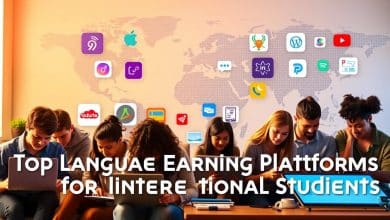Free Certifications That Can Boost Your Resume
Standing out in today’s job market requires more than just experience. Employers increasingly seek candidates who demonstrate verified expertise. Credentials from reputable programs act as third-party validation, bridging the gap between self-reported skills and employer expectations.
Many assume quality education comes with a high price tag. However, institutions like Google Career Certificates and LinkedIn Learning now offer accessible programs. These opportunities provide industry-aligned training without financial barriers, leveling the playing field for ambitious professionals.
Strategic credentialing serves multiple purposes. It reinforces specific abilities listed in professional summaries while showcasing dedication to growth. Hiring managers often prioritize applicants with tangible proof of competency, particularly when evaluating entry-level roles or career changers.
The right credentials can unlock doors across industries. From digital marketing to project management, these programs teach practical skills employers actively seek. They transform theoretical knowledge into actionable value, creating clearer pathways for advancement.
The Importance of Certifications on a Resume
Third-party endorsements of skills are reshaping how candidates prove their expertise. These credentials act as neutral validators, turning subjective claims into measurable assets. They answer a critical question for employers: “Can this person deliver what their application promises?”
Enhancing Credibility and Professional Image
Certifications transform abstract skills into verified capabilities. A project management badge from PMI or a coding certificate from Microsoft tells employers you’ve met industry standards. This builds trust before the first interview. Professionals with credentials often see faster career progression, as these achievements signal commitment to growth.
Verifying Skills for Hiring Managers
Hiring teams face stacks of applications with overlapping qualifications. Certifications cut through the noise by providing concrete proof of competency. For example:
| Industry | Mandatory Certification | Value-Add Credential |
|---|---|---|
| IT Security | CISSP | Google Cybersecurity Certificate |
| Digital Marketing | N/A | Meta Social Media Marketing |
| Healthcare | RN License | CPR/AED Training |
Networking opportunities also emerge through certification communities. Alumni groups and forums connect professionals, creating pathways for mentorship and collaboration. In salary talks, credentials provide leverage by quantifying specialized knowledge.
Overview of Today’s Free Certification Landscape
Education platforms have evolved dramatically, creating accessible pathways for skill-building across industries. Over 70% of professional training now occurs through digital formats, reflecting a global shift toward flexible credentialing. Leading universities and tech giants now design programs aligned with current workforce demands.
The Shift to Online Learning
Traditional classroom models struggle to match the convenience of modern platforms. Self-paced courses allow professionals to balance work commitments while mastering new tools. Platforms like Coursera and edX partner with institutions to deliver content matching on-campus rigor.
Employers increasingly recognize credentials from these programs. A 2023 LinkedIn survey found 81% of hiring managers value verified digital badges as much as traditional degrees for technical roles. This acceptance fuels demand for specialized training in fields like data analytics and AI.
Benefits for Career Development
Skill-based credentials create measurable career advantages. They demonstrate updated expertise in fast-changing fields like cybersecurity or digital marketing. Professionals report 35% faster promotion rates after completing industry-recognized programs.
Key advantages include:
- Immediate application of job-ready skills
- Networking through global learner communities
- Competitive differentiation in applicant pools
Quality assurance remains critical. Reputable providers use proctored exams and project-based assessments to maintain standards. These measures ensure credentials hold real-world value for both learners and employers.
Free Resume Certifications: A Strategic Edge
Modern hiring processes increasingly rely on automated tools to manage candidate selection. Applicant tracking systems (ATS) filter thousands of applications by scanning for specific terms aligned with job descriptions. Credentials listed in resumes often determine whether a candidate advances to human review.
How Certifications Improve ATS Performance
These systems prioritize measurable qualifications over generic claims. Including industry-aligned credentials matches the exact keywords employers program into their searches. For example, listing a cybersecurity certification when applying for IT roles increases visibility in applicant pools.
Recruitment software assigns higher scores to profiles containing verified expertise. This automated prioritization creates a critical advantage in competitive fields. Candidates with relevant credentials often bypass initial filters that eliminate 75% of applicants.
| ATS Filter Criteria | Certification Impact | Outcome |
|---|---|---|
| Keyword Match Rate | +40% Visibility | Higher Ranking |
| Skill Verification | Automated Validation | Interview Shortlist |
| Role-Specific Terms | Precision Targeting | Relevance Boost |
Specialized credentials also address experience gaps by demonstrating applied knowledge. Hiring managers view these achievements as evidence of proactive skill development. In oversaturated markets, this differentiation often decides who secures interviews.
Popular Platforms Offering Free Online Courses
Digital education platforms are revolutionizing professional development by removing cost barriers. Four leading providers deliver industry-aligned training through structured programs and expert-led content.
HubSpot Academy and Coursera
HubSpot Academy specializes in marketing and sales credentials. Their Inbound Marketing Certification teaches content creation, lead generation, and campaign analysis through interactive modules. Professionals praise its practical approach to digital strategy.
Coursera partners with institutions like Yale and companies like IBM. Learners access university-level courses in data science and business management. Many programs include graded assignments and peer feedback, mirroring classroom rigor.
edX and Alison’s Offerings
edX collaborates with over 100 universities to provide no-cost access to STEM and humanities courses. Their MicroMasters programs offer pathways to credit-bearing credentials. Learners can audit materials indefinitely or pay for verified certificates.
Alison features 1,300+ skill-based programs across technology, healthcare, and design. Courses include workplace simulations and competency checks. The platform organizes content by career stage, helping users target specific growth areas.
These learning platforms maintain quality through proctored exams and project evaluations. Employers increasingly recognize their credentials as proof of current, applicable skills. Users report completing programs 30% faster than traditional education models due to flexible scheduling.
Industry-Specific Certifications to Boost Your Profile
Specialized expertise separates contenders from frontrunners in competitive fields. Targeted credentials demonstrate mastery of tools and methodologies specific to high-demand roles. Professionals who align their learning with industry needs often gain first-mover advantages.
Marketing, Analytics, and Inbound Strategies
Google Analytics Academy remains essential for digital marketing professionals. Their courses teach traffic pattern analysis and conversion optimization. Marketers learn to translate raw data into campaign improvements.
HubSpot Academy dominates inbound marketing education. Their content marketing certification covers audience targeting and lead nurturing tactics. “These skills directly impact revenue generation,” notes a HubSpot program graduate.
Technical and Programming Skill Courses
FreeCodeCamp’s coding curriculum has launched over 40,000 careers at tech giants. Learners build portfolio-worthy projects using Python and JavaScript. Programming fundamentals translate across industries from fintech to healthcare IT.
Data science professionals benefit from CognitiveClass.ai’s IBM-developed courses. Machine learning modules and data visualization training prepare users for analytics roles. These skills help organizations interpret complex information ecosystems.
Emerging fields like AI and cybersecurity offer new certification pathways. Specialized credentials in these areas signal adaptability to technological shifts. They provide concrete evidence of cutting-edge competency.
Leveraging Free Certifications for Inbound Marketing
Modern marketing demands digital fluency backed by verifiable expertise. Specialized credentials in tools like Google Analytics and Ads have become essential for executing data-driven campaigns. These programs equip professionals with measurable skills that align with real-world business objectives.
Building Expertise with Google Ads and Analytics
HubSpot’s Inbound Marketing Certification condenses critical strategies into 4.5 hours of focused learning. The 11-lesson curriculum covers content creation frameworks, social media amplification tactics, and conversion rate optimization. “This program teaches how to turn visitors into customers through strategic storytelling,” explains a HubSpot course instructor.
Google’s training ecosystem offers three progressive tiers for analytics mastery:
- Beginners: Website tracking fundamentals
- Advanced: Cross-channel attribution models
- Power Users: Predictive analytics techniques
Paid advertising specialists benefit from Google Ads credentials in specialized areas like AI-driven campaign optimization and display network management. These programs validate abilities to reduce cost-per-click while increasing conversion rates.
Marketing teams increasingly prioritize candidates who combine these credentials. A survey by Martech Alliance shows 68% of hiring managers use Google Analytics proficiency as a key screening criterion. Professionals with both HubSpot and Google credentials report 42% faster career progression in digital roles.
Showcasing Soft and Technical Skills Through Certifications
Modern professionals need more than job titles to prove their capabilities. Strategic credentials bridge the gap between claimed expertise and workplace demands. They provide tangible evidence of both technical mastery and interpersonal strengths employers prioritize.
Highlighting Core Competencies
Alison’s supervision training equips professionals with conflict resolution strategies and team leadership methods. These skills help managers address workplace challenges while fostering collaborative environments. One graduate noted: “The course transformed how I approach employee feedback and task delegation.”
Technical programs like Great Learning’s Excel training teach beginners data manipulation and visualization techniques. These computer-based skills apply to roles ranging from finance to operations management. Hands-on projects simulate real-world scenarios, building confidence in handling complex spreadsheets.
Yale’s Science of Well-Being course demonstrates commitment to personal growth while teaching psychological principles. Such training improves emotional intelligence, directly benefiting client interactions and team dynamics. Professionals gain tools to manage stress and enhance workplace relationships.
Communication credentials validate abilities like persuasive writing and effective presentation delivery. Combined with technical expertise, these skills create well-rounded candidates prepared for modern challenges. Employers increasingly seek this dual competency in fast-paced, collaborative environments.
How Online Certifications Support Continuous Learning
MOOCs revolutionize access to high-quality education beyond traditional classroom walls. Platforms like Open Culture partner with leading universities to deliver courses spanning astrobiology, cryptocurrency, and financial engineering. These programs mirror on-campus rigor while accommodating diverse schedules.
The Role of MOOCs and Self-Paced Courses
Self-directed learning formats empower professionals to master skills without career interruptions. Open Culture’s catalog features philosophy lectures from Yale and IoT training from Stanford. Learners explore niche topics through:
- Video lectures from faculty
- Interactive simulations
- Peer discussion boards
LinkedIn Learning offers 18,000+ programs with skill demonstrations. Their one-month trial lets users complete multiple credentials in focused sprints. “I earned three marketing badges during evenings,” shares a retail manager who transitioned to digital strategy.
Modular course designs let professionals build expertise incrementally. Busy schedules become manageable through 30-minute daily sessions. Platforms track progress across devices, enabling learning during commutes or lunch breaks.
This flexibility helps workers adapt to industry shifts. Updated knowledge in emerging fields like AI ethics keeps professionals competitive. Continuous education transforms reactive skill updates into strategic career advancement.
Certification Options for Emergency Management and Child Care
Specialized fields demand credentials that address specific workplace challenges. Emergency response and child development roles require validated expertise to ensure safety and compliance. Industry-aligned programs now provide targeted learning paths for these critical sectors.
Essential Training for Public Safety and Health
FEMA’s Emergency Management Institute offers certification through its no-cost courses. Professionals gain preparedness training for disaster planning and crisis coordination. The program requires 8-12 self-paced hours, making it accessible for working adults.
Stanford University’s 11-hour course on Coursera tackles childhood nutrition strategies. Earning this certificate demonstrates understanding of meal planning and obesity prevention. Learners analyze dietary guidelines while creating actionable health plans for youth.
Both programs emphasize practical application. FEMA certification holders often lead workplace safety initiatives. Child nutrition credentials help educators and caregivers implement science-backed feeding practices. These certificates bridge theoretical knowledge with community impact.
FAQ
How do certifications improve a resume’s performance in applicant tracking systems?
Which platforms offer no-cost certifications for technical skills?
Can inbound marketing certifications enhance career opportunities?
Are there certifications for non-technical fields like emergency management?
How do self-paced certifications support continuous learning?
Do hiring managers prioritize certifications from specific providers?
What soft skills can certifications highlight?
Published on: 20 de August de 2025







